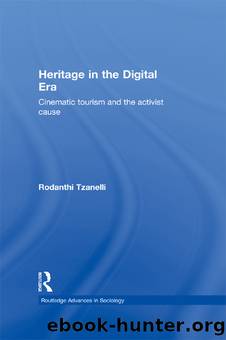Heritage in the Digital Era by Rodanthi Tzanelli

Author:Rodanthi Tzanelli [Tzanelli, Rodanthi]
Language: eng
Format: epub
Tags: Social Science, General, Sociology
ISBN: 9781136163364
Google: VJBuBAylgKQC
Publisher: Routledge
Published: 2013-03-05T04:45:39+00:00
5 Memory and protest
Yimou Zhangâs and Ai Weiweiâs artwork (2004â11)
Mobility and belonging in epistemic domains
Let us examine how the works of two of Chinaâs controversial artists â namely cinematic director Yimou Zhang and activist-architect Ai Weiwei â endorse imaginative forms of travel that render metropolitan Chineseness translucent across cultural planes. Once more, travel and tourism are differentiated experientially (Boorstin 1962; Bourdieu 1984). But whereas experiential creativity functions as a token of authenticity (presenting them as educated travellers, Grand Tourists of sorts), both artists declare attachment to popular culture and audience participation, thus advocating common tourist practices by technological means. I use the term pilgrimage here in recognition of the spiritual dimensions of both artistsâ journey but also to highlight its function as a human rite conducive to modern mobility cultures. Such analytical classifications conceal how the promise of demediation (experiential immediacy without technology) of travel experience is both âstandard to the marketing discourse of tourism [and] constitutive of the travel mythos as propagated by the very travellersâ (Strain 2003: 4).
The mobility of ethnic style is a marketable feature in mediascapes, especially when it is tied to imaginative forms of touring foreign lands, as is the case with the Beijing Summer Olympics (2008) to which both Zhang and Weiwei contributed. Although the Olympics are not the chapterâs centrepiece, they bind the two artistsâ passage from the private aura of ethnic artistic forms to the public domains of global fandom. I endeavour to show how, just as Vardalos, Zhang and Weiwei promote a form of organic art or artistic craft; and as members of a transnational epistemic community they were drawn into national and regional policy-making because their social identity and cultural status contributed to the Chinese Communist Partyâs (CCP) aspiration to enhance Chinaâs global political prestige (Haas 1992; Ong and Nomini 1997). Chinese policies strategically intertwined nationalist with cosmopolitan imperatives to this end (Conversi 2001; Drake 2003: 42). Following Den Xiaopingâs post-Maoist reforms, Chinese nation-building began to promote in new knowledge economies mergers of middle-classness with symbolic skills that hinged upon hegemonic narratives of art, but on the domestic stage it endeavoured to control and repress such identities because they clashed with traditional communist values (Xu 2007). The zeal to revive Confucian teachings in more recent years consolidated this oxymoron, whereby organic knowledge was both promoted and destroyed.
From the Maoist era the educated urban youth and intelligentsia were forced to move to rural or industrial areas in the CCPâs attempt to educate the peasantry and indoctrinate the middle classes into proletarian values. This phenomenon informs the biographies of Zhang and Weiwei. European social theory speaks of âopenâ and âclosedâ national cultures, domains of memory that define and are defined by the ethnic profiles of their human participants (Przeclawski et al. 2009: 173). This matches the relative âopenness or closedness of an media productâ (Schrøder et al. 2003: 136): without denying the plurality of potential meanings in different global settings, taking the Chinese political context as an interpretative ground limits my readings of Zhangâs and Weiweiâs artefacts to a manageable size in this chapter.
Download
This site does not store any files on its server. We only index and link to content provided by other sites. Please contact the content providers to delete copyright contents if any and email us, we'll remove relevant links or contents immediately.
Collaborating with Parents for Early School Success : The Achieving-Behaving-Caring Program by Stephanie H. McConaughy; Pam Kay; Julie A. Welkowitz; Kim Hewitt; Martha D. Fitzgerald(917)
Entrepreneurship Education and Training: The Issue of Effectiveness by Colette Henry Frances Hill Claire Leitch(684)
Materializing the Middle Passage by Jane Webster;(513)
Adding Value to Policy Analysis and Advice by Claudia Scott; Karen Baehler(500)
Race and American Political Development by unknow(493)
Sociological Perspectives of Health and Illness by Constantinos N. Phellas(493)
American Government and Politics Today by Steffen W. Schmidt Mack C. Shelley Barbara A. Bardes(488)
Human and Global Security : An Exploration of Terms by Peter Stoett(479)
Control Of Oil - Hardback by Kayal(476)
The Disappearance of Rituals: A Topology of the Present by Byung-Chul Han(422)
The Catholic Church and European State Formation, AD 1000-1500 by Jørgen Møller(406)
Advances in Child Development and Behavior, Volume 37 by Patricia J. Bauer(405)
The World According to China by Elizabeth C. Economy(392)
Theories of Counseling and Psychotherapy: A Case Approach by Nancy L. Murdock(383)
Application of classical statistics, logratio transformation and multifractal approaches to delineate geochemical anomalies in the Zarshuran gold district, NW Iran by unknow(377)
Left Is Not Woke by Susan Neiman(373)
Cross-Cultural Child Development for Social Workers by Lena Robinson(361)
Turkey's Relations with the West and the Turkic Republics: The Rise and Fall of the Turkish Model by Idris Bal(357)
Japan's Ainu Minority in Tokyo by Mark K. Watson(346)
